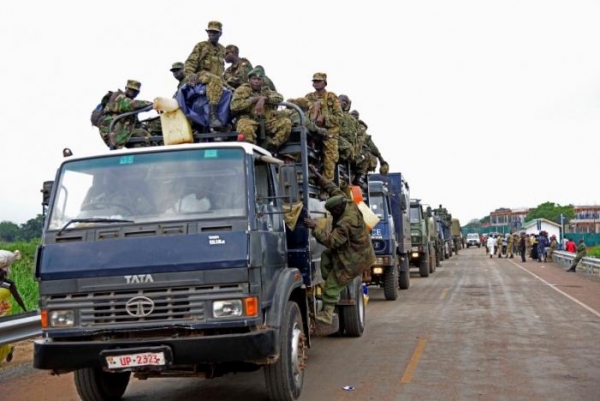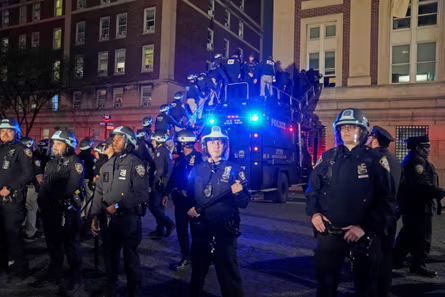On May 26, at a polling station in northern Uganda’s Omoro District, a crowd gathered around ballot boxes set beneath a mango tree on the side of a small dirt road. Elders in faded blazers, young men in second-hand soccer jerseys, and women with babies swaddled on their backs emerged from homesteads hidden in the tall grass to watch election officials count votes for a parliamentary by-election.
Beside them stood a number of security agents: two ordinary police officers in khaki uniforms; a counterterrorism police officer in a beret and shades; a soldier in camouflage pants; a riot police officer in a dappled blue uniform, who was not a soldier but certainly looked like one; and four men in balaclavas slouching in the back of a pickup truck. Most of them were carrying guns.
This scene at an obscure polling station illustrates some simple truths about the way the Ugandan state operates under President Yoweri Museveni, a former rebel who seized power in 1986. Soldiers seem to be everywhere—even civilian institutions now resemble military ones. Museveni buttresses his political power with security forces of all kinds, including intelligence agencies and police units, but it is military logic that reigns supreme. Under Museveni’s direction, the army is reaching ever deeper into Ugandan politics and society.
When civilian institutions are undermined, soldiers step in.
The army’s ubiquity shows the weakness of the state. The modern state of Uganda was created by British colonialists who did little to build a functioning bureaucracy. In the 1970s, then-Ugandan dictator Idi Amin ran what institutions there were into the ground. Faced with a legacy of state frailty, Museveni has time and again turned to the army, the only institution he truly trusts. Unlike the police or the civil service, which he inherited from previous regimes, the army is the direct descendant of the rebel force he personally built from scratch.
“Museveni has always been a military man who believes that the best way to organize, to control people, to dominate society, is to have the gun,” said Moses Khisa, a Ugandan political scientist at North Carolina State University. “But I think more recently, militarization has become more brazen and more pervasive because Museveni as a leader has become weakened [by] the many forces arraigned against him.”
Those forces include the tectonic pressure of demographics. According to the Uganda Bureau of Statistics, three-quarters of Ugandans are under the age of 30, and there are not enough decent jobs to go around. Popular frustration with corruption and inequality has found voice in opposition politics, manifesting in support for singer-turned-politician Bobi Wine and retired soldier Kizza Besigye. “[Museveni’s] primary focus has been on building the machinery, the military machine, to maintain his power and to expand it,” said Besigye, who fought alongside Museveni in the bush but has since run against him in four presidential elections.
“Museveni has always been a military man who believes that the best way to organize, to control people, to dominate society, is to have the gun.”
Elections are an obvious example of the army’s expansive role in the country. In Omoro, soldiers raided the local offices of an opposition party the night before the by-election, beating activists, stealing money, and confiscating documents, according to Human Rights Watch. On polling day, police and plainclothes gunmen detained opposition activists, including a member of parliament. Other recent by-elections have been marred by arrests, bribery, and credible allegations of ballot-stuffing. Such shameless repression recalls the brutality of the 2021 presidential election, when state forces harassed, arrested, kidnapped, tortured, and killed opposition supporters.
But the army’s writ runs wider than that. Consider the police. In the early years of his rule, Museveni openly questioned police officers’ loyalties: He once complained they would rather vote for a cow than vote for him. His remedy was to put the force under the command of army generals, such as Gen. Kale Kayihura, who served as a domineering police chief from 2005 to 2018. Although a civilian, Martin Okoth Ochola, is now the head of the force, many analysts think real power resides with a coterie of soldiers in senior posts.
The recruitment of army officers is “just downgrading police work … because these people have not been trained in the police service,” said Julius Odwe, a career police officer who was Kayihura’s deputy until Odwe retired in 2011. Many of Odwe’s old colleagues are demoralized, he added, as there are fewer and fewer civilian police officers in top positions. “I think that’s how the police institution will die because those who are professional, they have been demotivated,” he said.
And it is not just the police force that is filled with military men. Museveni has appointed three former army commanders to ministerial posts, along with six other serving or retired army officers. Both ministers of internal affairs are generals, as is the top civil servant at the ministry. Immigration control has been run by serving soldiers since 2019.
Militarization also extends beyond the security sector and into public service institutions, said Sylvie Namwase, a researcher at the Human Rights and Peace Centre at Makerere University in Kampala, Uganda. The army has entered many of these fields within the past decade, duplicating or supplanting the work of existing civilian institutions and civil servants.
For instance, a soldier heads the president’s “anti-corruption unit.” On Lake Victoria, the army brutally enforces fishing regulations. The army guards tax collection centers, fights locusts, runs factories, herds cattle, chases street vendors, and trains everyone from paramilitary wildlife rangers to water engineers. Vast areas of the economy, from seed distribution to minerals development, are now steered by Operation Wealth Creation, a sprawling military program.
As the army has expanded, so too has its budget. Security spending in Uganda tripled over the past four years, totaling $1.2 billion (4.7 trillion Ugandan shillings) for the 2020-2021 financial year. In addition, Uganda’s Parliament routinely passes supplementary budgets—a form of unplanned expenditure intended for unforeseen crises—to funnel classified funds to the army.
Army officers have justified their overreach by bemoaning bureaucratic failure and arguing that the military supports economic development. “If these civilian institutions indeed followed their procedures, followed the law, performed as expected, we’d have no business going in,” argued Brig. Gen. Felix Kulayigye, the army spokesperson who was previously its chief political commissar. He contrasted what he called the “graft” of civil servants and policemen to the sacrifices he said soldiers make for their country. “We have paid a price to see the Uganda it is today. However, our fellow citizens—that we gave the country to run—simply do their own things. Should we fold our hands and surrender?”
But the army, too, has a long history of corruption, from procurement scandals to the looting of gold, diamond, and timber in the Democratic Republic of the Congo. And by bypassing civilian structures, Museveni himself creates the conditions for their collapse. “He’s a micromanager, and he’s someone who’s incapable of building institutions,” said Mugisha Muntu, who commanded the army in the 1990s and last year ran as a presidential candidate for a small opposition party.
Museveni also leans on the army to concentrate power in his family. The dominant leader is Lt. Gen. Muhoozi Kainerugaba, Museveni’s son and commander of the land forces, who is angling to succeed him. And Gen. Salim Saleh, the president’s brother, leads Operation Wealth Creation, giving the first family direct control of a major lever of patronage.
Still, the army-state is not an all-encompassing monolith. For one, it is too weak to entirely silence dissent. There is a lively press and a vocal opposition. The space for both is closing fast, but Uganda is not yet a country like neighboring Rwanda, where politics is discussed only in whispers. Instead, the state uses coercion unpredictably, so the boundaries of permissible speech are never clear.
READ ALSO: Iran: Zionist regime has no fate other than collapse – FM spox
One example of arbitrary enforcement was the COVID-19 curfew in Uganda in 2020 and 2021. There were cars on the roads. Shuttered bars let drinkers slip in around the back. Yet the prospect of sudden violence was ever present, especially for the poor. At least a dozen people were shot to death during enforcement operations, usually by a state militia recruited and trained by the army. State power was neither total in its reach nor consistent in its application. It was abrupt and capricious.
This type of governance is best understood as a system of “institutionalized arbitrariness,” said Rebecca Tapscott, a lecturer at the Geneva Graduate Institute who has researched local security in Uganda. The authority of different actors—including the army, police, spies, militias, and vigilantes—is fluid. The line between lawful and unlawful violence is blurred. The state seems to be everywhere, even when it is not. The result is “a sustained state of political unpredictability that appears intentional to people who experience it and makes it very difficult for people to organize collectively,” Tapscott said.
The Human Rights and Peace Centre’s Namwase said she sees the same “deliberate ambiguity” behind the army’s expanding role in areas such as agriculture and fisheries management. “They keep institutions outside the realm of a structured legal framework so that there are no legal boundaries within which to push for accountability,” she said.
As for what this portends for Uganda’s future, Muntu, the former army commander, recounted a folktale about a hyena who tries to eat a stone that has been baked in ghee and salt. The stone becomes stuck in the greedy animal’s throat. “Should I spit? But it is sweet!” the hyena thinks. “Should I swallow? But it is hot!”
Museveni is trapped in a similar dilemma, Muntu said. He loves power too much to relinquish it. But to maintain his grip, he relies ever more on soldiers, trapping Uganda in the violent, militarized logic of its past.
Click Here to Read The Original Post












